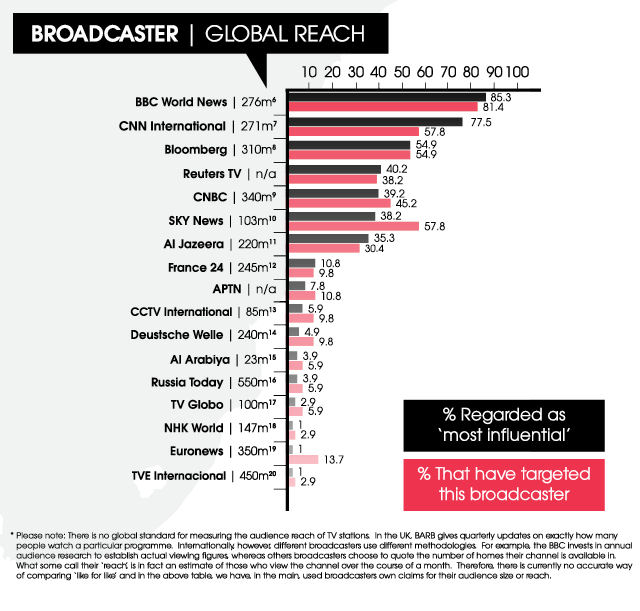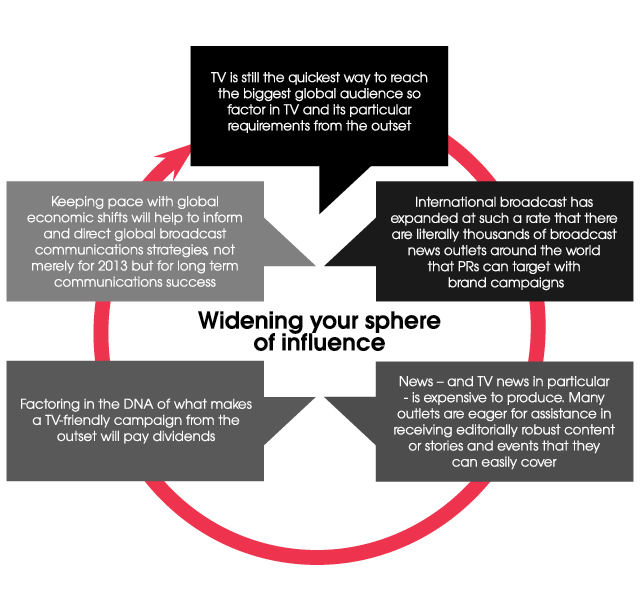Social media sites may have revolutionised our media, but that doesn’t mean that the traditional broadcasters, such as the BBC, have lost their power. According to a recent report, The Global Broadcast Landscape by PR consultancy markettiers4dc, traditional TV broadcasting is still the most effective way to reach the biggest global audience.
The television landscape has changed dramatically in the last 30 years, and whereas once CNN, the world’s first 24-hour news channel, ruled global broadcasting, today there are an estimated 200 rolling news or business channels that reach a global, continental or nationwide audience. The most recent expansion on global TV news has been fuelled by oil. Al Jazeera, Russia Today and Telesur in Venezuela are all backed by institutions funded by oil and gas profits. The US and Europe used to dominate global broadcast, but now they have competition from all over the globe. However, according to the report, London is still the broadcast capital of the world: “As home to the BBC World News, Sky and the BBC News channels plus being one of the global hubs for CNN, Reuters, APTN and Al Jazeera as well as European broadcast centres for CNBC, NHK and Bloomberg, London still bestrides the world as the broadcast capital.”
International TV Broadcasters - the Barometer of Influence

Over 100 communications professionals were interviewed to find out which international broadcast outlets they believe have the greatest global influence. Traditional international media owners such as the BBC were seen as highly influential and so are most targeted by communications teams.
Howard Kosky, chairman of markettiers4dc Group, believes it is vital for PROs to understand global media, as he fears that many are failing to make the most of opportunities that it offers: “At a time when the world of broadcast is going through another cycle of evolution, driven by technology and our appetite for more content, more frequently, I wonder how long it will take us to fully grasp the opportunities that are in front of us? Granted, while not every agency or brand will have a global remit, the inescapable truth remains, we now compete on a global level. The terms of business are changing, and with that change a golden ticket for those that move swiftly.”
Influence within broadcast PR

Describing what the “golden ticket” is for fast-acting PROs, Kosky explains: “To deliver global coverage on behalf of clients reaching tens or hundreds of millions of people more effectively than ever before. Whether you were a fan of the Olympics or believe the legacy statements we see and hear so much of, the fact is the world’s leading global broadcasters all invested in a resource in the UK which, when the curtain came down on the closing ceremony, remains – to a degree – in place. And this means that access to broadcasters throughout the world has never been easier. But how many of us are looking at the opportunity and grasping it with both hands? With competition in the market intensifying and the PR pound more competitive, while some may get excited about 100,000 views of a video on YouTube, I’d argue that reaching tens of millions via a more traditional format should be a little more front of mind.”
The report concludes that too many PROs see global broadcast as the “icing on the cake”, which means they are failing to realise the full potential for brands to sell their products and services through broadcast media.
Background
The research for the report was carried out by insight agency Opinion Matters in October and November 2012 with a panel of communications professionals who have a remit of international broadcast. Click here for the full report.
PR Masterclass: The Intersection of PR and GEO
Join PRmoment for a Masterclass featuring 10 of the industry’s foremost experts. You will walk away with a clear, actionable strategy for adapting your content to an AI-first search environment.
Taking place on Wednesday 25th February in London, both virtual and in person tickets are available.
Early bird ticket sale ends Friday 9 January.
PR MasterclassIf you enjoyed this article, sign up for free to our twice weekly editorial alert.
We have six email alerts in total - covering ESG, internal comms, PR jobs and events. Enter your email address below to find out more:









